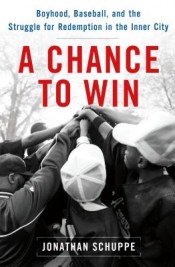Title: A Chance to Win: Boyhood, Baseball, and the Struggle for Redemption in the Inner City
Author: Jonathan Schuppe
Genre: Narrative nonfiction
Year: 2013
Publisher: Henry Holt and Co.
Acquired: LibraryThing Early Reviewers
Rating: 




Publisher’s Summary: For most of his young live, Rodney Mason was good at two things: dealing drugs and throwing a baseball. Then a drive-by shooting left the 27-year-old ex-con paralyzed, cutting that list to one. He vowed to turn his life around and to do it by returning to the game that he loved. Rodney decided to form a Little League team in Newark’s South Ward, hoping to save kids from the street life that had claimed his youth and his mobility, and maybe, in the process, to save himself, too. It wouldn’t be easy — these were kids from violent neighborhoods, with unstable home lives, few positive male role models, and failing schools. Most had never played baseball before, but, through the fists and tears, lopsided losses and rare victories, Rodney made them a team and gave their impoverished community something to root for.
Review: When I first grabbed A Chance to Win, I knew it was going to be exactly the kind of book I love to read. To tell this story, journalist Jonathan Schuppe spent years following Rodney Mason, a paralyzed drug dealer turned baseball coach, and his Little League team, writing a story that’s both about sports and about what happens in the places that people in power forget. It’s the wonderful kind of investigative and emotional narrative nonfiction I am drawn to.
As I’ve thought about the book, I realized that it’s actually a bit of a mash-up of two other books I love: Random Family by Adrian Nicole LeBlanc and Friday Night Lights by Buzz Bissinger. Like Random Family, A Chance to Win is about what it is like for kids to grow up in an abandoned, dangerous place. And like Friday Night Lights, it’s about the power that sports can have in a community as well as how sports are not the answer to every problem.
The emotional core of the story is Rodney, learning about his childhood, his dreams to play baseball, his temptation into gang life and his meandering journey to try and help other kids avoid his path. But Schuppe also wisely follows two of Rodney’s players and their families to get a broader look both at what this Little League program could accomplish and the overwhelming odds these kids face anyway. It’s far-reaching and awfully sad, sometimes. This is not a feel good story because the kids win. It’s satisfying, I suppose, because despite everything some of them keep trying.
If there is one critique I have about the book, it’s that there are almost no women or girls. Part of that is the point, built into the entire premise of the story — because boys get involved in the drug business, few grow into men or have children that they can or will mentor. Schuppe asserts that since baseball is a sport passed down from fathers to sons (a contention that feels a little dubious, since I think you could say the same thing about other sports), it doesn’t have a chance in a place like South Newark with no male role models. That, in turn, makes Rodey’s role as an adult male mentor and coach even more important and worth writing about.
While I’m totally on board with the premise, I still wish there was a little more about life for girls in this area. Schuppe does write about a couple of mothers (mostly in relation to the men in their lives), but there’s only one girl on the baseball team who, in the end, doesn’t get much time in the story. Intellectually, I know there’s not much to be done about this — she just doesn’t fit into the way Schuppe decide to frame this story, and you can’t invent more girls to play baseball — but I still couldn’t help wanting that story too. I am on the lookout for a book that fills this niche — the life for young women in troubled neighborhoods — so if you have any recommendations, dear readers, please let me know.
But despite the fact that I just spent two paragraphs complaining about it, in the grand scheme of this book it’s a pretty minor issue. Overall, Schuppe does a remarkable job writing a compassionate but honest story about what life is like in a place most of us have decided to ignore and what happens when one person (flawed and imperfect and complicated) steps up and tries to make a difference. A Chance to Win is a wonderfully thoughtful book that I highly recommend.
Other Reviews: … and a little wine |
If you have reviewed this book, please leave a link to the review in the comments and I will add your review to the main post. All I ask is for you to do the same to mine — thanks!


Comments on this entry are closed.
I really loved A Chance to Win. I see your point about the women mainly featuring in relation to the men in their lives, but I think that’s (at least in part) a reflection of where they spent their energies. The lack of male role models in a poverty decimated American community impacts the adults of the as much as the children.
It’s actually a little unfair of a critique of the book for exactly the reason you said. But it was something I noticed and I”m still curious about.
Thanks for bringing another great nonfiction book to my attention Kim!